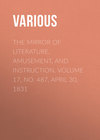Loe raamatut: «Blackwood's Edinburgh Magazine — Volume 53, No. 327, January, 1843», lehekülg 14
CHAPTER III
In the meanwhile Mr Nicholas Clam, and the lady leaning on his arm, had proceeded in silence, for the lady's thoughts were so absorbed that she paid no attention to the many prefatory coughs with which her companion was continually clearing his throat. He thought of fifty different ways of commencing a conversation, and putting an end to the rapid pace they were going at. But onward still hurried the lady, and breathless, tired, disconcerted, and very much perplexed, Mr Clam was obliged to continue at her side.
"This all comes of Mrs Moss writing a book," he muttered, "and being a philosophical character. What business had she to go publishing all that wonderful big volume above my mantel-piece—'Woman's Dignity; developed in Dialogues?' Without that she never would have found out that I could not be a sympathizing companion without the advantages of travel, and I never should have left number four, to be quarrelled with by every whipper-snapper of a soldier, and dragged to death by a woman unknown—a synonymous personage, as Mrs M. would say, that I encountered in a coach. 'Pon my word, ma'am," he added aloud, driven to desperation by fear of apoplexy from the speed they were hurrying on with, "this is carrying matters a little too far, or a great deal too fast at least. Will you let me ask you one question, ma'am?"
"Certainly, sir," replied the lady; "but oh, do not delay!"
"But I must delay though, for who do you think can have breath enough both to speak and run? And now, will you tell me, ma'am, what all this is about—why that young soldier and I were forced to quarrel—what you came down from London for, and what you are going to do at the barracks?"
"You will hear it all, sir; you shall know all when we arrive. But do not harrow my feelings at present, I beseech you. It may all end well, if we are in time; but if not"—
The look of the lady, and her tone as she said this, did not by any means contribute to Mr Clam's satisfaction. However, he perceived at once that further attempts to penetrate the mystery would be useless, and he kept musing on the strangeness of the circumstance, as profoundly puzzled as before. On getting into the barrack-yard, the lady muffled herself in her veil more closely than ever, and asked one of the soldiers she met in the archway, if Captain Hope "was in his room?"
"He's not come ashore yet, ma'am," said the soldier, "we expect him every moment with the last detachment from the transport."
"Not come yet?" exclaimed the lady; "which way will they march in?"
"Up the Main Street, and across the drawbridge," said the soldier, goodnaturedly.
"I wished to see him—to see him alone. Oh, how unfortunate he is not arrived!"
"Now, 'pon my word," muttered Mr Clam, "this is by no means a favourable specimen of woman's dignity developed in dialogues. I wish my infernal thirst for knowledge and swelling-out the intellect hadn't led me into an acquaintance with a critter so desperate fond of the soldiers; and Captain Hope, too! Oh, I see how it is—this here lady, in spite of all her veils and pretences, is no better than she should be; or rather, a great deal worse. Think of Mrs M. falling into hysterics about a Captain Hope! It's a case of a breach of promise. What should we do now, ma'am?" he said, anxious to disengage himself, and a little piqued at the want of confidence his advances had hitherto been received with. "If you'll tell me the whole story, I shall be able to advise"—
"Oh, you will know it all ere long. Soldier," she said to the man who had answered her former questions, "is there any lady in the barrack—the wife of one of the officers?"
"There's our colonel, ma'am—at least the colonel's wife, ma'am; she's inspecting the regiments baggage in the inner court"
"Come, come!" said the lady hurriedly, on hearing this, and again Mr Clam was forced along. In the inner court a stout lady, dressed in a man's hat and a green riding-habit without the skirts, was busily employed in taking the numbers of an amazing quantity of trunks and boxes, and seeing that all was right, with the skill and quickness of the guard of a heavy coach. She looked up quickly when she saw Mr Clam and his companion approach.
"I hope you will pardon me, madam, for addressing you," said the latter, dropping Mr Clam's arm, and lifting her veil.
"Be quick about it," said the colonel's wife; "I've no time to put off. Hand down that box, No. 19, H. G.," she continued to a sergeant who was perched on the top of the luggage.
"I wished to see you on a very interesting subject, madam."
"Love, I'll bet a guinea—who has deserted you now?—that green chest, Henicky, No. 34."
"There is an officer in this regiment of the name of Chatterton?"
"Yes, he's one of my young men, though I've not seen him yet. What then?"
"Can I speak to you for a minute alone?"
"If it's on regimental business, I shall listen to you, of course; but if it's some nonsensical love affair, you must go to Colonel Sword. I never trouble myself about such matters."
"If I could see Colonel Sword, madam"—
"Why can't you see him? Go into the commandant's room. You'll find him rocking the cradle of Tippoo Wellington, my youngest son! That other box, Henicky, L. M. And who is this old man with you?" continued Mrs Sword. "Your attorney, I suppose? See that you aren't ducked at the pump before you get out, old man; for I allow no lawyers inside these walls."
"Ma'am?" enquired Mr Clam, bewildered at the sudden address of the officer in command.
"It's a fact, as you'll find; so, make haste, young woman, and Sword will settle your business."
"Captain Hope is not come on shore yet, I believe?" said the lady.
"Charlie Hope? No! he's bringing the men and baggage. Has he deserted you too? Go to Sword, I tell you; and let your legal friend retreat without beat of drum. How many chests is this, Henicky?"
The Amazonian Mrs Sword proceeded with her work, and Mr Clam stood stupified with surprise. His companion, in the mean time, proceeded as directed to the commandant's house, and in a short time found herself in presence of Colonel Sword.
The colonel was a tall thin man, with a very pale face, and a very hooked nose. He was not exactly rocking the cradle of Tippoo Wellington, as supposed by his wife, but he was reposing in an easy attitude, with his head thrown back, and his feet thrown forward, and his hands deeply ensconced in his pockets. The apparition of a stranger roused him in a moment. He was as indefatigable in politeness, as his wife had been in her regimental duties.
"I was in hopes of finding my brother, Captain Hope, in the barracks, sir," she began; "but as I am disappointed, I throw myself on your indulgence, in requesting a few minutes' private conversation."
"A sister of Captain Hope? delighted to see you, my dear—did you see Mrs Sword as you came in?"
"For a minute, but she was busy, and referred me to you."
"She's very good, I am sure," said the colonel.—"How can I be of use?"
"I have a sister, Colonel Sword, very thoughtless, and very young. She became acquainted about a year ago with Mr Chatterton of your regiment—they were engaged—all the friends on both sides approved of the match, and all of a sudden Mr Chatterton wrote a very insulting letter, and withdrew from his engagement."
"The devil he did? Is your sister like you, my dear?"
"We are said to be like, but she is much younger—only eighteen."
"Then this Chatterton is an ass. Good God! what chances silly fellows throw away! And what would you have me do?"
"Prevent a duel, Colonel Sword. My brother is hot and fiery; Mr Chatterton is rash and headstrong. There will be enquiries, explanations, quarrels, and bloodshed. Oh, Colonel, help me to guard against so dreadful a calamity. I was anxious to see Charles, to tell him that the rupture was on Marion's side—that she had taken a dislike to Chatterton. We have kept it secret from every body yet. I haven't even told my husband."
"You're married, then?"
"To Captain Smith, once of this regiment."
"Ah, an old friend. Give me your hand, my dear—we must keep those wild young fellows in order. If I see them look at each other, I'll put them both in arrest. But what can be the meaning of Chatterton's behaviour? I hear such good reports of him from all hands! M'Toddy writes me he is the finest young man in the corps."
"I can't pretend to guess. He merely returned all my sister's letters, and wished her happy in her new position."
"What position was that?"
"A very unhappy one. She has been ill and nervous ever since."
"So she liked the rascal. Strange creatures you girls are! Well, I'll do my best. I'll give my wife a hint of it, and you may depend on it, if she takes it in hand, there will be no quarrelling under her—I mean under my command. If you go towards the harbour, you'll most likely encounter your brother. In the meantime, I will go to Chatterton, and take all necessary precautions. And Captain Smith knows nothing of this?"
"Nothing.—He was on a visit at Oakside, my sister's home, and I took the opportunity of his absence, to run down and explain matters to Charles. I must return to town immediately; for if I am missed, my husband will make enquiries, and he will be more difficult to pacify than my brother." So saying, they parted after a warm shake of the hand—but great events had occurred in the meantime in the barrack-yard.
"Who is that young woman?" said the Colonel's wife, to our astonished friend Mr Clam. "Have you lost your tongue, sir?—who is she, I say?"
"If you were to draw me with horses, I could'nt tell you, ma'am—'pon my solemn davit," said Mr Clam.
"Oh, you won't tell, won't you?" returned the lady, cocking her hat, and leaving the mountain of baggage to the care of her friend Sergeant Henicky. "I tell you, sir, I insist on knowing; and if you don't confess this moment, I shall perhaps find means to make you."
"Me, ma'am? How is it possible for me to confess, when I tell you I know nothing about her? I travelled with her from London in the coach—am very likely to get shot by a young soldier on her account—brought her here at a rate that has taken away all my breath—and know no more about her than you do."
"A likely story!—but it won't do for me, sir; no, sir—I see you are an attorney—ready to prosecute some of my poor young men for breach of promise; but we stand no nonsense of that kind in the gallant Sucking Pidgeons. So, trot off, old man, and take your decoy-duck with you, or I think its extremely likely you'll be tost in a blanket. Do you hear?—go for your broken-hearted Desdemona, and double-quick out of the yard. I'll teach a set of lawyers to come playing the Jew to my young men. They shall jilt every girl in England if they think proper, and serve them right too—and no pitiful green-bag rascal shall trouble them about such trifles—right about face—march"—
"Madam," said Mr Clam, in the extremity of amazement and fear, "did you ever happen to read 'Woman's Dignity, developed in Dialogues?' It's written by my friend, Mrs Moss, No. 5, Waterloo Place, Wellington Road, Regent's Park—in fact, she's my next door neighbour—a clever woman, but corpulent, very corpulent—you never met with 'Woman's Dignity, developed in Dialogues?'"
"Woman's idiocy, enveloped in petticoats! Who the devil cares about woman, or her dignity either? I never could bear the contemptible wretches. No—give me a man—a good, stout-hearted, front-rank man—there's some dignity there—with the eye glaring, nostril widening, bayonet fixed, and double-quick the word, against the enemies' line. But woman's dignity!—let her sit and sew—work squares for ottomans, or borders for chair-bottoms—psha!—beat a retreat, old man, or you'll be under the pump in two minutes. I'll teach you to talk nonsense about your women—I will—as sure as my name is Jane Sword and I command the Sucking Pigeons!"
"Pigeons don't suck, ma'am. Mrs M. lent me book of nat'ral history"—
"You'll find they'll bite, tho'—Henicky, take a corporal's guard, and"—
"Oh no, for heaven's sake, ma'am!" exclaimed Mr Clam. "Your servant, ma'am. I'm off this moment."
The unhappy victim of Mrs Moss's advice to travel for the improvement of his mind, thought it best to follow the orders of the military lady in the riding-habit, and retired as quickly as he could from the barrack yard. But, on arriving at the outer archway, shame, or curiosity, or some other feeling, made him pause. "Am I to go away," he thought, "after all, without finding out who the lady is or what business brought her here—what she knows about Chatterton—and what she wants with Hope? There's a mystery in it all. Mrs M. would never forgive me if I didn't find it out. I'll wait for the pretty critter—for she is a pretty critter, in spite of her not telling me her story—I think I never saw such eyes in my life. Yes—I'll wait." Mr Clam accordingly stopped short, and looked sharply all round, to watch if his fair companion was coming. She was still detained in the colonel's room.
"Will you pardon me for addressing a stranger, sir?" said a gentleman, politely bowing to Mr Clam.
"Oh, if it's to ask what o'clock it is, or when the coach starts, or any thing like that, I shall be happy to answer you, sir, if I can," replied Mr Clam, whose liking for new acquaintances had not been much increased by the events of the day.
"I should certainly not have taken the liberty of applying to you," continued the stranger, "if it had not been under very peculiar circumstances."
"Are they very peculiar, sir?" enquired Mr Clam.
"Yes—as you shall have explained to you some other time."
"Oh, you won't tell them now, won't you? Here's another mystery. 'Pon my word, sir, so many queer things happen in this town, that I wish I had never come into it. I came down only to-day per coach"—
"That's fortunate, sir; if you are a stranger here, your service to me will be greater."
"What is it you want? My neighbour in No. 5—a very talented woman, but big, uncommonly big—says in her book, never purchase the offspring of the sty enveloped in canvass—which means, never meddle with any thing you don't know."
"You shall know all—but I must first ask, if you are satisfied, will you be my friend in a troublesome matter in which I am a party?"
"Oh, you're in a troublesome matter too, are you?—as for me, I came down from London with such a critter, so pretty, so gentle, such a perfect angel to look at!"
"Oh, I don't wish to have your confidence in such affairs. I am pressed for time," replied the stranger, smiling.
"But I tell you, I am trying to find out what the matter is that you need my help in."
"I beg pardon. I thought you were telling me an adventure of your own"—
"Well sir, this beautiful critter asked my help, just as you're doing—dragged me hither and thither, first asking for one soldier, then another."
"And finally, smiling very sweetly on yourself. I know their ways—said the stranger.
"Do you, now? Not joking?—Oh lord! the sooner the better, for such lips to smile with, are not met with every day. Well sir, then there came up a puppy fellow of the name of Chatterton."
"Oh, Chatterton!" said the stranger; "that is curious."
"And insulted us, either her or me I forget which; but I blew him up, and he said he would send a friend to me"—here a new thought seemed to strike Mr Clam—his countenance assumed a very anxious expression—"you're not his friend, sir?" he asked.
"No sir; far from it. He is the very person with whom I have the quarrel."
"You've quarrelled with him too? Another breach of promise?—a wild dog that Chatterton."
"Another breach! I did not know that that was your cause of quarrel."
"Nor I; 'pon my solemn davit, I'm as ignorant as a child of what my quarrel is about; all that I know is, that my beautiful companion seemed to hate the sight of him."
"Then I trust you won't refuse me your assistance, since you have insults of your own to chastise. I expect his message every moment. My name is Captain Smith."
"And mine, Nicholas Clam, No. 4, Waterloo Place, Welling"—
"Then, gentlemen," said Major M'Toddy, lifting his hat, "I'm a lucky man—fortunatus nimium, as a body may say, to find you both together; for I am charged with an invitation to you from my friend Mr Chatterton."
"Oh! he wants to make it up, does he, and asks us to dinner? No. I won't go," said Mr Clam.
"Then you know the alternative, I suppose!" said the Major.
"To pay for my own dinner at the inn," replied Mr Clam; "of course I know that."
The Major threw a glance at Mr Clam, which he would probably have taken the trouble to translate into two or three languages, although it was sufficiently intelligible without any explanations, but he had no time. He turned to Captain Smith, and said:—
"I'm very sorry, Captain Smith, to make your acquaintance on such a disagreeable occasion. I've heard so much of you from mutual friends, that I feel as if I had known you myself, quod facit per alium facit per se—I'm Major M'Toddy of this regiment."
"I have long wished to know you, Major, and I hope even this matter need not extend any of its bitterness to us."
The gentlemen here shook hands very cordially—
"Well, that's a rum way," said Mr Clam, "of asking a fellow to go out and be shot at. But this whole place is a mystery. I'll listen, however, and find out what this is all about."
"And noo, Captain Smith, let me say a word in your private ear."
"Privateer! that's a sort of ship," said Mr Clam.
"I hate eaves-droppers," continued the Major, with another glance at Mr Clam—"odi profanum vulgus, as a body may say—and a minute's talk will maybe explain matters."
"I doubt the power of a minute's talk for any such purpose," said Captain Smith, with a smile; "but," going a few yards further from Mr Clam at the same time—"I shall listen to you with pleasure."
"Weel, then, I canna deny—convenio, as a body may say—that in the first instance, you played rather a severe trick on Mr Chatterton."
"I play a trick!" exclaimed Captain Smith; "I don't understand you. But proceed, I beg. I will not interrupt you."
"But then, on the other hand, it's not to be denied that Mr Chatterton's method of showing his anger was highly reprehensible."
"His anger, Major M'Toddy!"
"'Deed ay, just his anger—ira furor brevis—and it's really very excusable in a proud-spirited young man to resent his being jilted in such a sudden and barefaced manner."
"He jilted! but again I beg pardon—go on."
"Nae doubt—sine dubio, as a body may say—the lassie had a right to change her mind; and if she thought proper to prefer you to him, I canna see what law, human or divine"—
"Does the puppy actually try to excuse himself on so base a calumny as that Marion preferred me? Major M'Toddy, I am here to receive your message; pray deliver it, and let us settle this matter as soon as possible."
"Whar's the calumny?" said the major. "You wadna have me to believe, Captain Smith, that the lady does not prefer you to him?"
"Now perhaps she does, for she has sense enough and pride enough, I hope, to despise him; but never girl was more attached to a man in the world than she to Chatterton. Her health is gone—she has lost the liveliness of youth. No, no—I am much afraid, in spite of all that has passed, she is fond of the fellow yet."
"How long have you suspected this?" enquired the major.
"For some time; before my marriage, of course, I had not such good opportunities of judging as I have had since."
"Of course, of course," said the major, in a sympathizing tone; "it's bad business. But if you had these suspicions before, what for did you marry?"
"Why? Do you think things of that sort should hinder a man from marrying the girl he likes? Mrs Smith regrets it as much as I do."
"Then what for did she not tell Chatterton she was going to marry you?"
"What right had he to know, sir?"
"A vera good right, I think; or if he hadna, I wad like to know wha had?"
"There, sir, we differ in opinion. Will you deliver your message, name your place and hour, and I shall meet you. I shall easily get a friend in this town, though I thought it better at one time to apply to a civilian; but I fear," he added, with a smile, "my friend Mr Clam will scarcely do."
"I really dinna ken—I positively don't know, as a body may say, how to proceed in this matter. In the first place, if your wife is over fond of Chatterton."
"My wife, sir?"
"'Deed ay—placens uxor, as a body may say—I say if your wife continues to like Chatterton, you had better send a message to him, and not he to you."
"So I would, if she gave me occasion, Major M'Toddy; but if your friend boasts of any thing of that kind, his conduct is still more infamous and intolerable than I thought it."
"But your ainsel'—your own self told me so this minute."
"You mistake, sir. I say that Marion Hope, my wife's sister, is still foolish enough to like him."
"Your wife's sister! You didna marry Chatterton's sweetheart?"
"No, sir—her elder sister."
"Oh, lord, if I had my fingers round the thrapple o' that leein' scoundrel on the tap of the coach! Gie me your hand, Captain Smith—it's all a mistake. I'll set it right in two minutes. Come with me to Chatterton's rooms—ye'll make him the happiest man in England. He's wud wi' love—mad with affection, as a body may say. He thought you had run off with his sweetheart, and it was only her sister!"
Captain Smith began to have some glimmerings of the real state of the case; and Mr Clam was on the point of going up to where they stood to make further enquiries for the improvement of his mind, when his travelling companion, again deeply veiled, laid her hand on his arm.
"Move not for your life!" she said.
"I'm not agoing to move, ma'am."
"Let them go," she continued; "we can get down by a side street. If they see me, I'm lost."
"Lost again! The mystery grows deeper and deeper."
"One of these is my husband."
Mr Clam drops her arm. "A married woman, and running after captains and colonels! Will you explain a little ma'am, for my head is so puzzled, that hang me if I know whether I stand on my head or my heels?"
"Not now—sometime or other you will perhaps know all; but come with me to the beach—all will end well."
"Will it?—then I hope to heaven it will end soon, for an hour or two more of this will kill me."
The two gentlemen, in the meantime, had disappeared, and Mr Clam was on the eve of being hurried off to the harbour, when a young officer came rapidly towards them.
"Charles!" cried the lady, and put her arms round his neck.
"There she goes!" said Mr Clam—"another soldier!—She'll know the whole army soon."
"Mary!" exclaimed the soldier—"so good, so kind of you to come to receive me."
"I wished to see you particularly," she said, "alone, for one minute."
The brother and sister retired to one side, leaving Mr Clam once more out of ear-shot.
"More whispering!" muttered that disappointed gentleman. "This can never enlarge the intellect or improve the mind. Mrs M. is a humbug—not a drop of information can I get for love or money. Nothing but whisperings here, closetings there—all that comes to my share is threats of shootings and duckings under pumps. I'll go back to Waterloo Place this blessed night, and burn 'Woman's Dignity' the moment I get home."
"Then let us go to Chatterton's rooms," said the young officer, giving his arm to his sister; "I have no doubt he will explain it all, and I shall be delighted to see your husband."
"She's going to see her husband! She's the wickedest woman in England," said Mr Clam, who caught the last sentence.
"Still here'" said a voice at his ear—"lurking about the barracks!"
He looked round and saw the irate features of the tremendous Mrs Sword. He made a rapid bolt and disappeared, as if he had a pulk of Cossacks in full chase at his heels.
The conversation of the good-natured Colonel Sword with Chatterton had opened that young hero's eye so entirely to the folly of his conduct, that it needed many encouraging speeches from his superior to keep him from sinking into despair.—"That I should have been such a fool," he said, "as to think that Marion would prefer any body to me!" Such was the style of his soliloquy, from which it will be perceived, that in spite of his discovery of his stupidity, he had not entirely lost his good opinion of himself—"to think that she would marry an old fellow of thirty-six! What will she think of me! How lucky I did not write to my father that I had broken matters off. Do you think she'll ever forgive me, colonel?"
"Forgive you, my, dear fellow?" said the colonel; "girls, as Mrs Sword says, are such fools, they'll forgive any thing."
"And Captain Smith!—a fine gentlemanly fellow—the husband of Marion's sister—I have insulted him—I must fight him, of course."
"No fighting here, young man; you must apologize if you've done wrong; if not, he must apologize to you; Mrs Sword would never look over a duel between two Sucking Pigeons."
"Then I must apologize."
"Ye canna have a better chance—you can't have a better opportunity, as a body may say," said the bilingual major, entering the room, "for here's Captain Smith ready to accept it."
"With all his heart, I assure you," said that gentleman, shaking Chatterton's hand; "so I beg you'll say no more about it."
"This is all right—just as it should be," said the Colonel. "Captain Smith, you'll plead poor Chatterton's cause with the offended lady."
"Perhaps the culprit had better be his own advocate—he will find the court very favourably disposed; and as the judge is herself at the Waterloo hotel"—
"Marion here!" exclaimed Chatterton; "good heavens, what an atrocious ass I have been!"
"She is indeed," replied the Captain. "I knew she would be anxious to receive her brother Charles on his landing, and as I had wormed out from her the circumstances of this lover's quarrel"—
"Amantium ira amoris redintegratio est—as a body may say," interposed Major M'Toddy.
"And was determined to enquire into it, I thought that the pretence of welcoming Captain Hope would allay any suspicion of my intention; and so, with her good mother's permission, I brought her down, leaving my wife in Henley Street"—
"Where she didn't long remain," said no other than Captain Charles Hope, himself leading in Mrs Smith, the mysterious travelling acquaintance of Mr Clam.
"Do you forgive me," she said to her husband, "for coming down without your knowledge?"
"I suppose I must," said Captain Smith, laughing, "on condition that you pardon me for the same offence?"
"And noo, then," said Major M'Toddy, "I propose that we all, together and singly, conjunctim ac separatim—as a body may say—go down instanter to the Waterloo Hotel. We can arrange every thing there better than here, for we must hear the other side—audi alteram partem, as a body may say."
"This will be a regular jour de noce, as you would say, Major," remarked Colonel Sword, giving his arm to Mrs Smith.
"It's a nos non nobis, poor auld bachelors—as a body may say," replied the Major, and the whole party proceeded to the hotel.
Mr Clan, on making his escape from the fulminations of Mrs Sword, had been rejoiced to see his carpet-bag still resting against the wall under the archway of the inn, as he had left it when he first arrived.
"Waiter!" he cried; and the same long-haired individual in the blue coat, with the napkin over his arm, came to his call.
"Is there any coach to London this evening?"
"Yes, sir—at half-past six."
"Thank heaven!" exclaimed Mr Clam, "I shall get out of this infernal town. Waiter!"
"Yes, sir."
"I came from London to-day with a lady—close veiled, all muffled up. She is a married woman, too—more shame for her."
"Yes, sir. Do you dine before you go, sir." said the waiter, not attending to Mr Clan's observations.
"No. Her husband doesn't know she's here; but, waiter, Mr Chatterton does." Mr Clam accompanied this piece of information with a significant wink, which, however, made no sensible impression on the waiter's mind.
"Yes, Chatterton does; for you may depend on it, by this time he's found out who she is."
"Yes, sir. Have you secured a place, sir?"
"Now, she wouldn't have her husband know she is here for the world."
"Outside or in, sir? The office is next door"—continued the waiter.
"Then, there's a tall gentleman, who speaks with a curious accent. I wonder who the deuce he can be."
"No luggage but this, sir? Porter will take it to the office, sir."
"Nor that dreadful he-woman in the hat—who the mischief can she be? What had Chatterton done?—who is the husband?—who is the lady? Waiter, is there a lunatic asylum here?"
"No, sir. We've a penitentiary."
"Then, 'pon my davit, the young woman"—




















